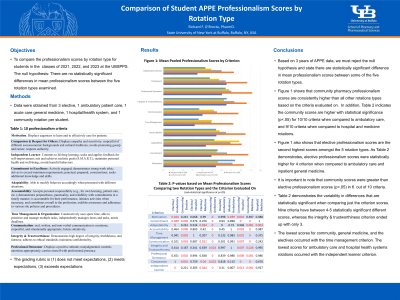Experiential Education
(302) Comparison of Student Advanced Pharmacy Practice Experiences Professionalism Scores by Rotation Type


Richard F. O'Brocta, PharmD.
Clinical Associate Professor
University at Buffalo, The State University of New York
Buffalo, New York, United States
Primary Author(s)
Objective : To compare the professionalism scores by rotation type for the classes of 2021, 2022, and 2023. The null hypothesis: There are no statistically significant differences in mean professionalism scores between the five rotation types examined.
Methods: We compared mean professionalism scores from 1053 Elective, 351 Ambulatory Care, 349 Community Pharmacy, 354 Health System, and 347 General Medicine rotation types. Each evaluation consists of 10 criteria that includes (1) Motivation, (2) Commitment to Excellence, (3) Adaptability, (4) Accountability, (5) Time Management, (6) Communication, (7) Integrity, (8) Professional Demeanor, (9) Compassion, and (10) Independent Learner. The student professionalism mean scores were compared for statistically significant differences at the p<.05 level using One-Way ANOVA and post-hoc Tukey.
Results: Overall, 44/100 mean comparisons had a significant difference. The comparison of Community to Ambulatory Care professionalism scores had statistical difference for all ten criteria, community had the higher scores in all comparisons. The comparison of Health System to Elective mean professionalism scores did not have any statistically significant differences. When comparing mean scores between professionalism criteria, Adaptability had the greatest number of significant differences in scores with six, and Integrity and Trustworthiness had the least with three.
Conclusions: We reject the null hypothesis as there are statistically significant differences in mean professionalism scores between some rotation types. This variability in scores indicates that we need to investigate why there are these differences, especially the difference in professionalism scores between Ambulatory Care and Community Pharmacy rotation types.
Methods: We compared mean professionalism scores from 1053 Elective, 351 Ambulatory Care, 349 Community Pharmacy, 354 Health System, and 347 General Medicine rotation types. Each evaluation consists of 10 criteria that includes (1) Motivation, (2) Commitment to Excellence, (3) Adaptability, (4) Accountability, (5) Time Management, (6) Communication, (7) Integrity, (8) Professional Demeanor, (9) Compassion, and (10) Independent Learner. The student professionalism mean scores were compared for statistically significant differences at the p<.05 level using One-Way ANOVA and post-hoc Tukey.
Results: Overall, 44/100 mean comparisons had a significant difference. The comparison of Community to Ambulatory Care professionalism scores had statistical difference for all ten criteria, community had the higher scores in all comparisons. The comparison of Health System to Elective mean professionalism scores did not have any statistically significant differences. When comparing mean scores between professionalism criteria, Adaptability had the greatest number of significant differences in scores with six, and Integrity and Trustworthiness had the least with three.
Conclusions: We reject the null hypothesis as there are statistically significant differences in mean professionalism scores between some rotation types. This variability in scores indicates that we need to investigate why there are these differences, especially the difference in professionalism scores between Ambulatory Care and Community Pharmacy rotation types.

.png)